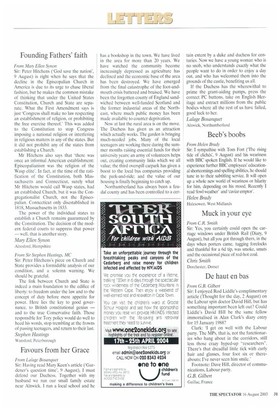Founding Fathers' faith
From May Ellen Synon Sir: Peter Hitchens (God save the nation', 9 August) is right when he says that the decline in the Episcopalian Church in America is due to its urge to chase liberal fashion, but he makes the common mistake of thinking that under the United States Constitution, Church and State are sepa rate. What the First Amendment says is just 'Congress shall make no law respecting an establishment of religion, or prohibiting the free exercise thereof.' This was added to the Constitution to stop Congress imposing a national religion or interfering in religious matters in any of the states. But it did not prohibit any of the states from establishing a Church.
Mr Hitchens also says that 'there was once an informal American establishment: Episcopalianism was the religion of the Wasp elite'. In fact, at the time of the ratification of the Constitution, both Mas sachusetts and Connecticut, surely what Mr Hitchens would call Wasp states, had an established Church, but it was the Con gregationalist Church, not the Episcopalian. Connecticut only disestablished in 1818, Massachusetts in 1833.
The power of the individual states to establish a Church remains guaranteed by the Constitution. The decision of the modern federal courts to suppress that power — well, that is another story.
Ally Ellen Synon
Alresford, Hampshire
From Sir Stephen Hastings, MC Sir: Peter Hitchens's piece on Church and State provides a formidable analysis of our condition, and a solemn warning. We should be grateful.
The link between Church and State is indeed a main foundation to the edifice of liberty: to freedom under the law and to the concept of duty before mere appetite for power. Here lies the key to good governance. to British constitutional genius — and to the true Conservative faith. Those responsible for Tory policy would do well to heed his words, stop trembling at the frowns of passing teenagers, and return to their last.
Stephen Hastings
Wansford, Peterborough










































































 Previous page
Previous page